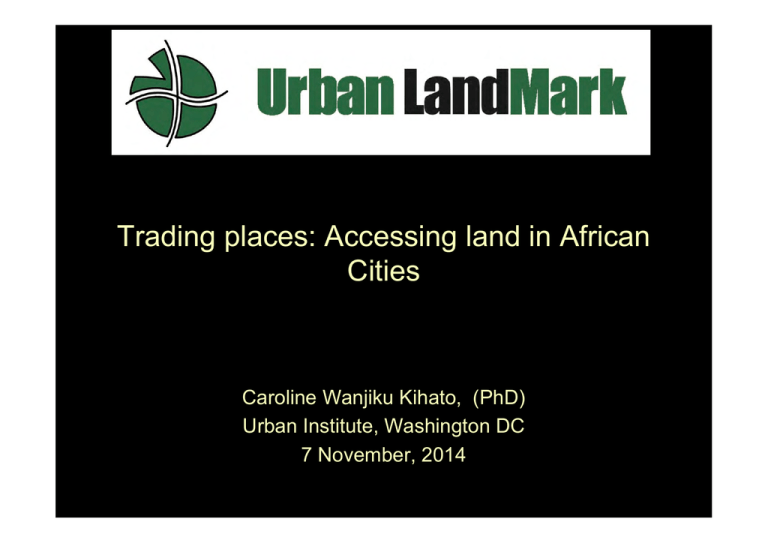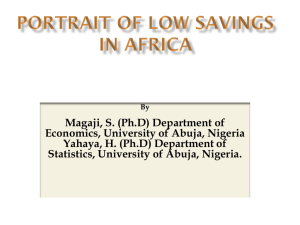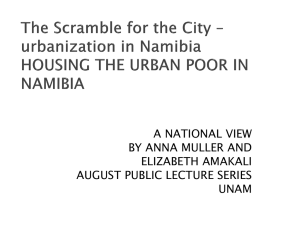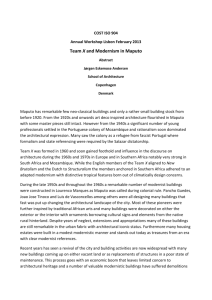Trading places: Accessing land in African Cities Caroline Wanjiku Kihato, (PhD)
advertisement

Trading places: Accessing land in African Cities Caroline Wanjiku Kihato, (PhD) Urban Institute, Washington DC 7 November, 2014 Urban growth: The African context • African urbanisation resulting in high demand for land • By 2050, 60% of Africans will live in cities • By 2015 Lagos will grow by 58 people every hour, Kinshasa 39, Nairobi 15 • Informality is the predominant characteristic of urban growth • Fastest growing areas are peri-urban zones Land supply in African cities • Multiple systems of supply – formal & informal • Legal tenure: Common Law, Customary law, religious law • Majority of land holdings in African cities are in the informal “extralegal” sector Urban land markets: The governance challenges • Limited formal supply • Poor land administration and registration systems • Different systems of rights and practices • Mistrust in courts • High transaction costs The cost of being legal is exclusionary 34 Days 51 East Asia & Pacific 54 Middle East & North Africa 56 South Asia 62 133 116 OECD: High income 4.8 % of prop value 4.2 6.8 6.1 Latin America & Caribbean Europe & Central Asia Sub-Saharan Africa 5.6 3.2 14.4 Source: Doing business data base Study background • Operation of the Market Studies in South Africa, Maputo, Luanda • In Maputo – Hulene B and Luis Cabral Bairro’s in peri-urban areas • Survey of 568 households – 27% of the population. Study findings • Few households in Luanda’s musseques (6.8%) and Maputo’s bairros (2.6%) have formal title • An active informal market in land exists despite the fact that the sale of land is illegal in Mozambique and Angola Luanda 61% in Maputo 60% households bought their land. In Maputo, 33% said they were paying for the land, 12% both land and house and only 6% just the house • Only 6.3% responded that they had no agreement, indicating that having an agreement whether it is verbal or documented is an important aspect of accessing land in the informal market Study findings • Social networks and relationships play a major role in the land market In Maputo, 19% had verbal agreements witnessed by family members, neighbours and local leaders • Highly organized local administrative structures Secretario de bairro, Chefe de quarteirao - 50 households, Chefe de block 25 households, Chefe de dez casas – 10 households Andersen, 2009 Study findings • Local, neighbourhood leadership figures are significant in legitimizing agreements, resolving disputes, keeping land registers – the declaração is the primary form of documented evidence. 29% of households responded that they had received a declaração from the Secretario de Bairro • Despite not having formal title 66.5% of those surveyed in Maputo and 85% in Luanda had a strong or very strong sense of security Governance puzzle • Informal sector key avenue of land supply for incoming populations • Lower transaction costs and obstacles • Technically illegal but socially legitimate • Local registers of ownership • Clearly identified regimes of authority Governance puzzle • The state is often present • Risky investment, yet active market • Do not fit neoclassical economic models Rethinking governance • Move beyond binaries: legal/illegal; regulated/ unregulated; legible/ illegible etc. • How to adapt institutional models to realities on the ground? – Flexible models that recognise local practices – Expanding categories to allow for multiple relationships to land How to avoid elite or ‘gang capture, and provide security for the urban poor Thank you www.urbanlandmark.org.za




